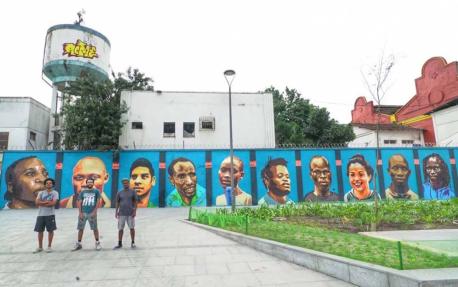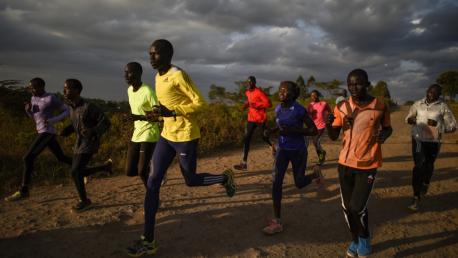
Bringing Hope to Children in Kenya's Kalobeyei Refugee Settlement
Amidst hardship and uncertainty, UNICEF and LDS Charities deliver education and opportunity to refugee children and their families.
As the day begins in the sprawling Kalobeyei Integrated Refugee Settlement in northwest Kenya, a chorus of voices can be heard singing. From where we are standing in Kalobeyei Village 1, the song grows in volume as the chorus, belonging to children from the settlement households and their teachers, approaches their destination, the Furaha Child-Friendly Center. The "Morning Train" is arriving!
Refugee children start each day by joining the "Morning Train" procession to school

What is the "Morning Train"? Every day, teachers from the Furaha Center, which is supported by UNICEF Kenya and operated by the Waldorf Kakuma Project, visit each household, picking up young children one by one, to start their day of early childhood development (ECD) activities with positive energy and momentum, and to make sure that no one is left behind. Teachers at the Furaha Center focus on education and play grounded in the arts (including painting, singing, drama and beading) as a means of helping refugee children process trauma and build foundations for lifelong learning.
Education and play grounded in the arts build foundations for lifelong learning
The "Morning Train" demonstrates the power of partnership to deliver hope and opportunity amidst hardship and uncertainty. Providing this safe and happy space for children who have experienced the trauma of displacement, conflict and poverty would not be possible without the dedicated support of partners like LDS Charities.

Children in Kenya's Kalobeyei Refugee Settlement participate in early childhood programs supported by UNICEF, LDS Charities and the Kakuma Waldorf Project. © Njeri Gakuo for UNICEF
UNICEF staff and representatives from LDS Charities recently visited Kalobeyei and Kakuma Refugee Camp, home to 190,000 refugees from 19 countries, including South Sudan, Burundi, Somalia, Ethiopia, the Democratic Republic of the Congo, Eritrea, Uganda and Rwanda — over 80 percent of them women and children. The majority of new arrivals are from South Sudan: Kenya is currently hosting more than 95,000 South Sudanese refugees. UNICEF works with partners to provide vital services like safe water and sanitation, nutrition, health, education, psychosocial support, immunization and more.
UNICEF and LDS Charities work together to train teachers and empower parents and community members
Our visit focused primarily on ECD and education. Kenya has struggled to accomodate the needs of the growing refugee population, but thanks to the support of LDS Charities, UNICEF has been able to increase the number of facilities, trained teachers and caregivers and provide educational materials for learning and play, while empowering parents and community members to invest in the positive and healthy growth of their children from the earliest years.
"The majority of children arriving in Kakuma have experienced the unspeakable," says LDS Charities Program Specialist Kristi Haycock. "To witness the safe environment of the Furaha Center, where children are enjoying fun, creative healing activities with the support of caring, knowledgeable teachers, I felt hopeful — hopeful that precious lives would be protected and nurtured. I'm grateful LDS Charities can provide support to these essential ECD services.

A Somalian refugee dad plays with his children at home in Kenya's Kakuma Refugee Camp. © Njeri Gakuo for UNICEF
"While I watched the "Morning Train" children gather in a large circle around their teacher to begin their morning, I noticed a little boy — 3 or 4 years old — on the periphery of the group. He couldn't see well over his taller classmates, and he turned his gaze on me. I moved closer and kneeled, extending my hand. He grasped my fingers," Haycock recalls. "Eventually, he began to mimic my body movements, so I followed the teacher as he led the group in song and dance. My friend soon engaged with the group and I faded into the background, encouraged that there was a safe place for a young boy to go where he would be noticed, taught and cared for. Now the work begins to ensure that every refugee child has the same opportunity."
The "Morning Train" is just one of many glimmers of hope as UNICEF and LDS Charities forge ahead in partnership to create spaces for protection, education and growth, building foundations for children that will allow them to reach their full potential despite having faced unimaginable adversity.

From left: LDS Charities representatives Kristi Haycock, Brett MacDonald and Matthew Heaps on the site of new early childhood classrooms at the Future Primary School in Kenya's Kalobeyei Refugee Settlement. © Njeri Gakuo for UNICEF
The Future Primary School, the only school facility in Kalobeyei Village 3, contains classrooms for primary school and ECD programs. Before the facility was completed, young children had to walk more than half a mile to attend other, overcrowded schools. This is progress, but more spaces are needed. There are more than 3,000 learners using the space, including more than 880 children in the ECD program — more than 200 children per classroom!
To ease overcrowding, LDS Charities is building more classrooms
This is changing, thanks to the support of LDS Charities, which is funding the construction of two new classrooms equipped with learning materials that will serve 60 students each at the Future Primary School. Expanding ECD services is vital to help vulnerable refugee children develop and cope with what they've experienced.
Construction is not just about the children: it's a community empowerment measure, too. The stones for the foundation are sourced and sold by local community members, and the construction of the facilities is an employment opportunity for refugees living in the settlement.

Students at the El Naam Girls School learn how to read and write, and also how to cope with the trauma they've experienced. © Njeri Gakuo for UNICEF
Children living in Kakuma and Kalobeyei have experienced loss, fear, loneliness, stress and violence. It takes a skilled teacher to not only teach and nurture properly but also to help students effectively cope with this trauma. Training and peer-to-peer mentoring programs supported by LDS Charities help teachers who are refugees themselves learn how to provide their students with quality education and ECD programs.
Teachers are trained to help students cope with trauma and loss
At El Naam Girls School, teacher Ifere Oheny Orion said the training taught him valuable strategies for teaching reading and comprehension skills. "We read letter by letter, then we give the word, so that the learners will get the word and get the meaning of the word at the same time," he explained. "The learners start to practice it and they are motivated. This program is really bringing good change to the community. If the program continues, it will help these learners individually and we will see those learners read."
Rachel Steinberg is Senior Director, Global Cause Partnerships at UNICEF USA.
LDS Charities, the humanitarian arm of the Church of Jesus Christ of Latter-Day Saints, sponsor relief and development projects in 189 countries. LDS Charities partners with UNICEF to support many of its programs, from emergency response and immunizations to education and early childhood development (ECD), particularly for those impacted by the global refugee crisis. In 2018, LDS Charities and UNICEF teamed up to build the Learning for Life program, supporting education and ECD for refugees in Uganda, Kenya, Sudan and the Democratic Republic of the Congo.
Photo at top: Young students in Kenya's Kalobeyei Refugee Settlement are building foundations for lifelong learning through a Waldorf-based curriculum that emphasizes play grounded in the arts. © Njeri Gakuo for UNICEF
HOW TO HELP
There are many ways to make a difference
War, famine, poverty, natural disasters — threats to the world's children keep coming. But UNICEF won't stop working to keep children healthy and safe.
UNICEF works in over 190 countries and territories — more places than any other children's organization. UNICEF has the world's largest humanitarian warehouse and, when disaster strikes, can get supplies almost anywhere within 72 hours. Constantly innovating, always advocating for a better world for children, UNICEF works to ensure that every child can grow up healthy, educated, protected and respected.
Would you like to help give all children the opportunity to reach their full potential? There are many ways to get involved.





